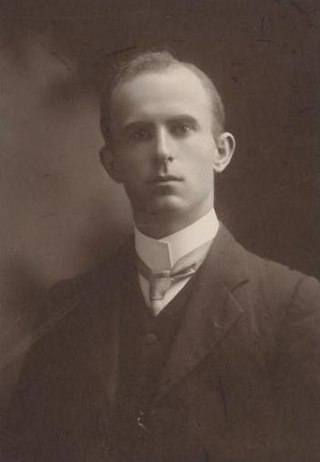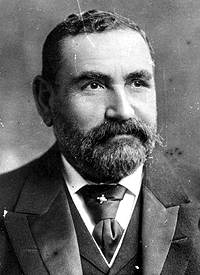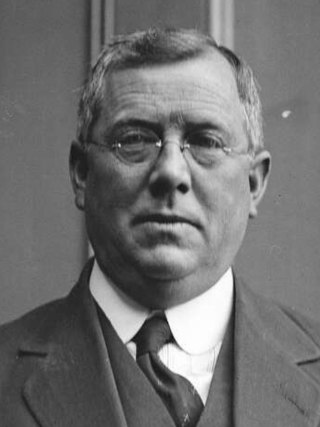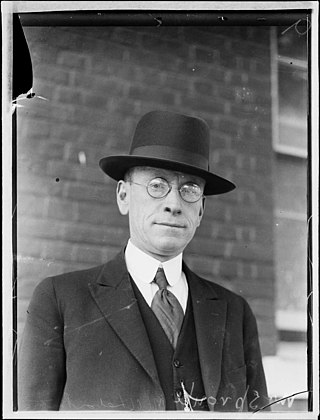
David Robert Hall was a politician and lawyer in New South Wales, Australia.

John Estell was a politician and coal miner in New South Wales, Australia. He was a member of the New South Wales Parliament for 29 years, including 20 years in the Legislative Assembly. He was a minister in the Holman, Storey and Dooley Labor governments.

The Treasurer of New South Wales, known from 1856 to 1959 as the Colonial Treasurer of New South Wales, is the minister in the Government of New South Wales responsible for government expenditure and revenue raising and is the head of the New South Wales Treasury. The Treasurer plays a key role in the economic policy of the government.
Abram Landa was an Australian politician and a member of the New South Wales Legislative Assembly from 1930 until 1932 and from 1941 until 1965. He was variously a member of the Australian Labor Party (NSW) and the Australian Labor Party. He held a number of ministerial positions between 1953 and 1965.

The Minister for Jobs and Tourism is a minister in the Government of New South Wales with responsibilities for tourism in the state of New South Wales, Australia. It has often been combined with other portfolio responsibilities, most commonly Sport.

The See ministry was the 30th ministry of the New South Wales Government, and was led by the 14th Premier, Sir John See. The title of Premier was widely used to refer to the Leader of Government, but was not a formal position in the government until 1920. Instead the Premier was appointed to another portfolio, usually Colonial Secretary.

The New South Wales Minister for Corrections is a minister of the Government of New South Wales who is commissioned with responsibility for the administration of correctional services, juvenile justice, and prisons in the state of New South Wales, Australia.

The New South Wales Minister for Agriculture is responsible for the administration and development of agriculture, fisheries, aquaculture, state forests, biosecurity, and crown lands in New South Wales, Australia.

The Storey ministry was the 37th ministry of the New South Wales Government, and was led by the 20th Premier, John Storey.

The Dooley ministry (1921) or the first Dooley ministry was the 38th ministry of the New South Wales Government, and was led by the 21st Premier, James Dooley. It was the first of two occasions that Dooley was Premier.

The Postmaster-General of New South Wales was a position in the government of the colony of New South Wales. This portfolio managed the postal department of the New South Wales Government and was in charge of all postal and communications services in the colony prior to the Federation of Australia, from 1835 to 1901. Upon Federation, Section 51(v) of the Constitution of Australia gave the Commonwealth exclusive power for "postal, telegraphic, telephonic, and other like services".

The Cahill ministry (1952–1953) or First Cahill ministry was the 55th ministry of the New South Wales Government, and was led by the 29th Premier, Joe Cahill, of the Labor Party. The ministry was the first of four consecutive occasions when the Government was led by Cahill, as Premier.

Sir David Storey was an Irish-born Australian politician and businessman. He was a member of the New South Wales Legislative Assembly from 1894 to 1920 and the New South Wales Legislative Council from 1920 until his death in 1924, representing the Free Trade Party and its successors the Liberal Reform Party and Nationalist Party. He was Minister of Public Health in the Nationalist ministry of William Holman in 1919–20.

The New South Wales Minister for Finance is a minister of the New South Wales Government within The Treasury and has responsibilities for matters relating to revenue collection policy and regulation in the state of New South Wales, Australia.

Robert Sproule was an Irish-born Australian public servant and politician who served as Solicitor General for New South Wales from 1920 until 1922.

Solicitor General for New South Wales, known informally as the Solicitor General, is one of the Law Officers of the Crown, and the deputy of the Attorney General. They can exercise the powers of the Attorney General in the Attorney General's absence. The Solicitor General acts alongside the Crown Advocate, and Crown Solicitor, and serves as one of the legal and constitutional advisers of the Crown and its government in the Australian state of New South Wales.
Members of the New South Wales Legislative Council who served from 1898 to 1901 were appointed for life by the Governor on the advice of the Premier. This list includes members between the election on 27 July 1898 and the election on 3 July 1901. The President was Sir John Lackey.

The Minister for Youth Justice, formerly Minister for Justice, is a ministry in the administration of New South Wales. The position supports the Attorney General and was sometimes, although not always, held concurrently with that office.

The Minister for Lands and Property, also called the Secretary for Lands was responsible for one of the key issues for the colonial administration of New South Wales, being the contest between squatters and selectors to dispossess the Aboriginal people of their land.
A by-election was held for the New South Wales Legislative Assembly electorate of The Hume on 10 September 1899 because William Lyne had been appointed Premier and Colonial Treasurer, forming the Lyne ministry. Until 1904, members appointed to a ministerial position were required to face a by-election. These were generally uncontested. Of the nine ministers appointed in the Lyne ministry, The Hume and Ashfield were the only electorates in which the by-election was contested.










